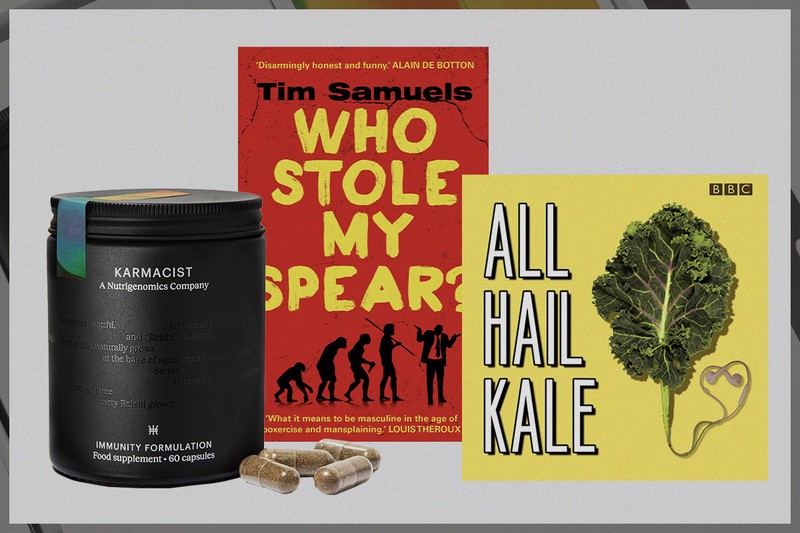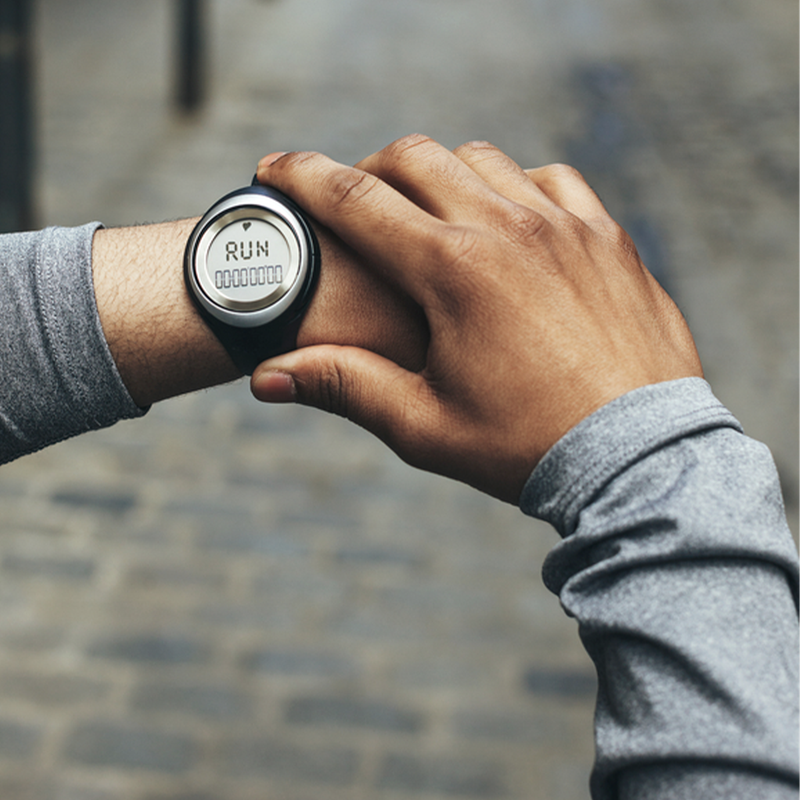My Health Rules: Tim Samuels
Mental health has always been something I’ve struggled with. For the last two decades, I’ve had the privilege of reporting around the world for the BBC and National Geographic TV. I’ve ended up in all sorts of hairy scenarios – like working undercover in Northern Ireland or trying to find the real murderers who’ve sent an innocent man to death row. On the lighter side, I turned a group of lonely old people into the world’s oldest rock group to highlight how terribly we treat the elderly. But all the while I’ve been prone to my own periods of depression or anxiety. At first, I kept shtum about it – it seemed too emasculating to admit to not feeling great. But then I took the decision that the taboo needed busting. I launched the BBC radio show Men’s Hour as a place for men to talk candidly. SAS author Andy McNab was a guest on the first episode – awkwardly sat alongside my therapist.
It's not easy being a guy these days. We all have a sense of what helps our mental health – such as exercising or unplugging from tech – but there are certain things that are crucial to men, given we are essentially hunter-gatherers in suits. We need to indulge our tribal nature by spending time with friends and feeling part of something bigger. We need to allow for testosterone to be released, but in positive ways – like a martial art. We need to find ways to ensure our whole identity isn’t linked to our job. So many men tie their sense of self-esteem to their work – and that’s precarious. Having other ways to feel productive – developing a skill or hobby that has nothing to do with work, can make a difference. Thankfully, the days of ‘manfully’ keeping a stiff upper lip are falling away. In fact, you’re more of a man to put your hand up, say you’re not feeling a million dollars and get some help.
The link between the gut and the brain is undeniable. I’ve road-tested so many fads, but the gut-mind link is particularly fascinating. This really struck home when I heard, during an episode of my All Hail Kale podcast, about a crazy mouse experiment. A professor of gastroenterology in Canada conducted a test on two very different types of mice: one was naturally very anxious and barely left the shadows of the cage; the other was confident, gregarious, and bounded around the cage without a care. He took stools from the different mice and put them inside each other’s stomachs, a poo swap known as faecal microbial transplantation. He then observed what happened – which was truly extraordinary. Three weeks later the mice had essentially swapped personalities: the once-shy mouse had become confident while the carefree mouse was now prone to hiding in the shadows. Just by exchanging their gut bacteria he’d changed their personalities. It just goes to show how strong the gut-mind link is – and that has real insights for how we improve our mental wellbeing.

Meditation is a game-changer. Having spoken to so many experts over the years, I’ve learnt what works and what doesn’t when it comes to wellness. There’s real science behind meditation and I find transcendental meditation (a form of silent, mantra meditation) the most powerful. Just 20 minutes can be equivalent to a deep sleep. Meditation gets us back into that state of ‘flow’, which would naturally have come when hunting or doing a skilled piece of labour. The wellness trends I’ve ended up embracing in the long term come back to keeping in sync with how humans were designed. I try to walk everywhere, covering at least 7,500 steps every day, ideally at a pace where I’d need to take off a jumper or jacket. We’re built to walk for long distances, and you’d often wear your prey down through tracking them into exhaustion. Full-on marathons, though, were not part of the design.
We’d all be better off ditching dairy. This may seem like another health fad, but there’s some truth behind it. As humans, we’re just not designed to down the infant formula of another species. Alas, I can’t quite shake off the occasional piece of cheese.
The right supplements are worth their weight in gold. While making my podcast, I met some brilliant Harvard and Stanford researchers in a pioneering branch of science called nutrigenomics, which explores how particular nutrients can impact certain genes and, crucially, the gene expression that is so pivotal to so much of our wellbeing. The good news is that we aren’t doomed by our parents’ DNA – as so many genes can be switched on and off through lifestyle, of which nutrition plays a major part. So, exploring this relationship between nutrients and genes is an exciting new breakthrough. Karmacist has fused nutrigenomics research with the wisdom of the botanicals we’ve been turning to for 60,000 years.
The right supplements are worth their weight in gold. While making my podcast, I met some brilliant Harvard and Stanford researchers in a pioneering branch of science called nutrigenomics, which explores how particular nutrients can impact certain genes and, crucially, the gene expression that is so pivotal to so much of our wellbeing. The good news is that we aren’t doomed by our parents’ DNA – as so many genes can be switched on and off through lifestyle, of which nutrition plays a major part. So, exploring this relationship between nutrients and genes is an exciting new breakthrough. Karmacist has fused nutrigenomics research with the wisdom of the botanicals we’ve been turning to for 60,000 years.
Everything’s backed by science. Plenty of guys are sceptical when it comes to supplements and I get it: being a journalist, my default position is extreme scepticism, so I always look for the data. Take saffron, for example, which has been shown in clinical trials to be just as effective as Prozac for treating mild to moderate depression. We know plants are powerful healers – in fact, so many modern medicines are derived from plants. Saffron is one of the key ingredients in our Mood Formulation, alongside resilience-building passionflower, adaptogenic turmeric and other key micronutrients to support optimal psychological function.
Ayurveda is one of the world’s oldest holistic healing systems. Dr Uma Naidoo, one of the scientists behind Karmacist, is a nutritional psychiatrist at Harvard Medical School – and a real pioneer in the research showing how diet and particular nutrients can affect your mental health. This science chimes with the Indian heritage that she grew up. For example, she starts the day with a turmeric latte – a tradition passed down from her grandmother, and one that has celebrated turmeric as an Ayurvedic superstar for 4,000 years. Indeed, turmeric – along with ashwagandha – are now heralded as adaptogens, to help the body handle stress. This mirrors our Karmacist approach – using modern science to see how, and why, these ancient ingredients can be of real benefit.
Having a solid morning routine is a good place to start. I recently interviewed Robin Sharma – author of The Monk Who Sold His Ferrari – on the podcast, who writes about the benefits of waking up at 5am. Alas, I am not that person. I had a DNA test, which confirmed I am an owl and not a lark, but come 8am, I practise Wim Hof’s cold shower routine. I make the water as hot as possible, then switch the dial around to go as cold as possible – for about a minute and a half. To keep Baltic thoughts away, I sing the old Grandstand theme tune – no doubt much to the bemusement of my neighbours. I then try to have as mindful a breakfast as possible – by slowing down my eating, rather than wolfing it all down in two minutes. I’ll put a podcast on too. It’s important to have a laugh in the morning to kick-start serotonin, so I’ll pop on the Hawksbee and Jacobs show from TalkSport – which is pure, puerile pleasure.
Breakfast is the most important meal of the day. I’m a creature of habit and for me, breakfast tends to be porridge made with a splash of water, blueberries, cinnamon, pecans and ground flaxseeds – all gently heated into a blueberry muffin-like texture. Yes, flaxseeds and TalkSport football banter are odd companions, but modern men are hard to pigeonhole. I’ll also have a cup of breakfast tea with almond milk – and wash down some of our Immunity supplements.
Eating well is a simple way to look after your health. I buy dark chocolate every week, without fail – it’s a full-blown addiction, with Green and Black’s 85% the current drug of choice. Having been told dark chocolate is good for our stem cells, I guess there are worse vices to have. I’m also a fan of The Mighty Mighty loaf by Modern Baker. Bread has – rightly – been given a hard time lately, given how adulterated the process has become. But Modern Baker has created loaves which are health positive – drawing off ancient grains and long fermentation. I also eat a lot of berries – Dr Michael Greger told me a handful of berries can improve your cognitive function within hours – and nuts, which are great for topping up your protein intake. Also, when doing a piece for National Geographic on the decline of sperm counts, a doctor told me walnuts were excellent for the swimmers. I also rate black rice noodles, which are a great way to get a pasta fix without overdoing gluten. However, there’s nothing worse than being a food bore. At the weekend, I’ll slacken up, eat what I fancy and enjoy a piece of cake.
Exercise is crucial to keep the body strong as you age. I aim to get to the gym twice a week – I’m currently into HIIT-style cycling. As I’ve got older, I’m slightly more wary of the yoga I’ve been doing for the last 20 years, as I see people who’ve pushed their knees and hips in ways they weren’t intended to be pushed. There’s a danger of pushing things beyond our limits, especially given that competitive male streak. Having never bothered with weights, that’s now changing. Seeing Clint Eastwood at 91 is the ultimate example of how so much of ageing is in our hands.
If you do anything, get the fundamentals in place. Live in harmony with what your body and mind is wired for, which means simplifying life. Eat well, move your body in a way it wants to move, spend time with your tribe of friends and family, don’t overload the mind with social media nonsense, and find that state of flow, whether it’s in a book, film, cooking or hobby. And if things start to edge towards the danger zone, then get writing – write a journal about what your best mate would tell you to do in this situation. So often we just need to regain a sense of perspective.
For more information, visit Tim-Samuels.com and Karmacist.com. Tune into All Hail Kale via Apple podcasts.
DISCLAIMER: We endeavour to always credit the correct original source of every image we use. If you think a credit may be incorrect, please contact us at [email protected].


